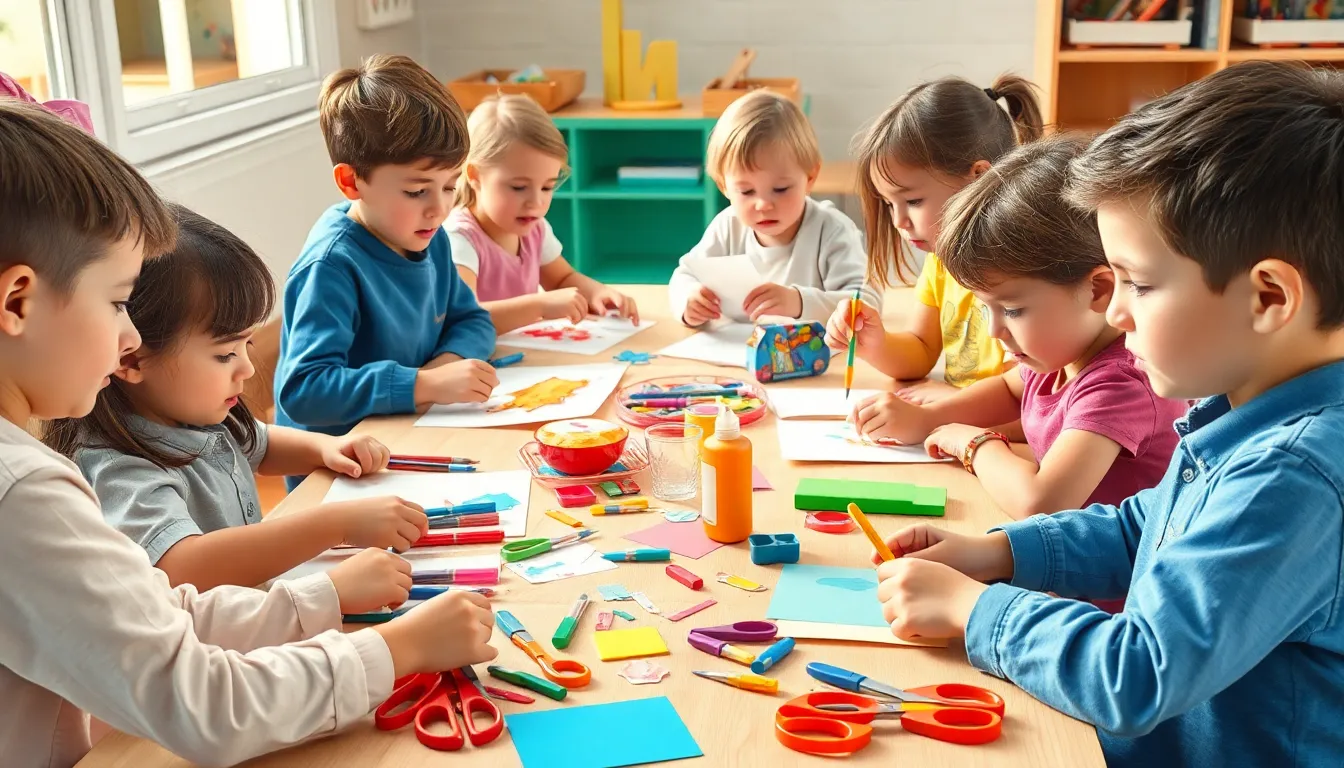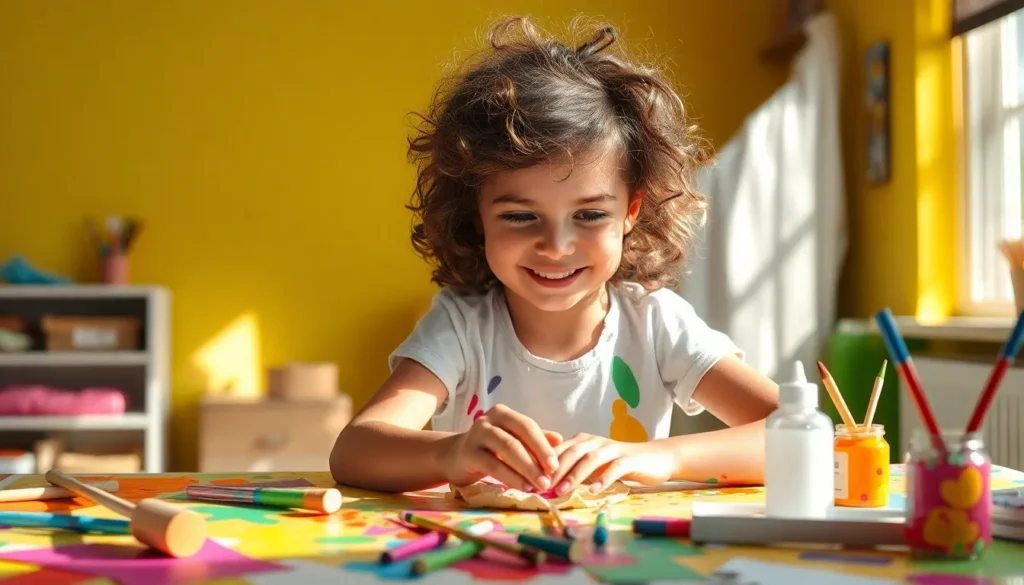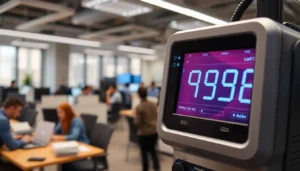Table of Contents
ToggleIn a world where screens often steal the spotlight, educational crafts swoop in like superheroes to save the day. These delightful activities not only spark creativity but also sneak in some learning while kids are having a blast. Who knew that making a paper mache volcano could teach geology? It’s like turning playtime into a mini classroom without the boring lectures!
Overview of Educational Crafts
Educational crafts encompass a wide range of activities designed to enhance learning through creativity and hands-on engagement. These projects facilitate skill development across various subjects, merging fun with educational objectives. Children utilize resources like paper, paints, and recycled materials to create unique items while grasping essential concepts.
Art projects like building a solar system model foster understanding of astronomy and planetary science. Crafting encourages critical thinking, as kids analyze instructions and make choices about their designs. Working in teams boosts collaboration skills, enhancing social interaction while learning from one another.
Visual arts intersect with science when kids create nature-themed crafts. Nature-inspired projects, such as leaf rubbings or flower presses, demonstrate biological diversity and environmental awareness. Hands-on experiences reinforce lessons, making complex ideas more accessible.
Math concepts also find a place in educational crafts. Activities such as constructing geometric shapes with straws promote spatial awareness and enhance mathematical understanding. Kids discover symmetry and patterns while having a creative outlet.
Many resources exist to guide parents and educators in implementing educational crafts. Websites, books, and online communities offer valuable ideas to ignite children’s imaginations. Selecting age-appropriate crafts fosters confidence and ensures successful outcomes.
Educational crafts convert play into valuable learning experiences. These projects stimulate curiosity and creativity, providing a platform for children to explore and understand the world they inhabit.
Benefits of Educational Crafts

Educational crafts provide numerous benefits beyond just fun. They enhance learning opportunities for children while fostering creativity.
Cognitive Development
Cognitive skills develop through engaging projects. Children learn to solve problems during crafting, which encourages critical thinking. Understanding concepts from various subjects, like math or science, becomes easier when applied creatively. Additionally, analyzing results encourages evaluation of their work, which enhances reasoning abilities. Projects that require instructions or following a sequence reinforce comprehension skills, promoting better retention of knowledge.
Motor Skills Enhancement
Crafting activities significantly improve fine motor skills. Manipulating small objects, like scissors or paintbrushes, develops hand-eye coordination. Grasping, cutting, and gluing various materials strengthens hand muscles and dexterity. These movements lay a foundation for future skills, such as writing or typing. Engaging in intricate tasks promotes patience and focus, which are essential for overall motor skill enhancement.
Types of Educational Crafts
Educational crafts take many forms and serve different purposes. These activities provide interactive experiences, fostering both creativity and learning.
Art and Craft Projects
Art projects engage children in creative expression while teaching valuable concepts. Building a solar system model enhances understanding of planetary movements and space. Paper mache sculptures allow children to explore texture and structure, igniting interest in art and design. Scrabble tile art promotes vocabulary and spelling through a fun medium. Painting nature scenes teaches color theory and appreciation for the environment. Crafting with recycled materials encourages resourcefulness and environmental consciousness. Projects like these not only enhance artistic skills, but also improve fine motor abilities, necessary for future academic tasks.
Science Experiments
Science experiments focus on hands-on learning through exploration. Creating a baking soda volcano demonstrates chemical reactions in an exciting way. Making homemade slime illustrates concepts like viscosity and states of matter. Building a simple circuit using a battery and light bulb introduces basic electricity principles. Projects that involve growing crystals deepen understanding of natural processes. Conducting experiments reinforces hypotheses and encourages scientific inquiry. Engaging in these activities nurtures curiosity and critical thinking, essential elements in developing a scientific mindset.
Tips for Successful Educational Crafts
Successful educational crafts engage children and promote learning. Understanding how to choose appropriate projects can make a significant difference in their experience.
Choosing Age-Appropriate Crafts
Select projects that align with children’s developmental stages. Younger kids benefit from simple crafts involving basic materials and techniques. Activities like finger painting or paper plate animals stimulate creativity without overwhelming them. For older children, choose more complex crafts that challenge skills and knowledge, like building models or experimenting with mixed media. Craft projects should resonate with their interests, ensuring they remain engaged throughout the process. Using guides for educational crafts tailored to specific age groups enhances the likelihood of success and enjoyment.
Ensuring Safety during Crafting
Promoting a safe crafting environment is crucial for enjoyable experiences. Always supervise children, especially during projects requiring sharp tools or small parts. Use non-toxic materials to minimize health risks. Checking for age recommendations on craft supplies helps in preventing accidents. Encourage proper usage of tools, reminding kids to handle scissors and adhesives with care. Establishing a clean workspace reduces hazards, making it easier to concentrate on the activity. Discuss safety rules beforehand, ensuring children understand the importance of following them throughout the craft.
Educational crafts offer a unique opportunity for children to learn through hands-on experiences. By integrating creativity with essential academic concepts, these activities not only make learning enjoyable but also foster critical skills. As children engage in crafting projects they develop fine motor skills and enhance their problem-solving abilities.
Parents and educators play a vital role in guiding children toward age-appropriate crafts that align with their developmental stages. By creating a safe and stimulating environment for crafting, they can nurture curiosity and creativity. Ultimately, educational crafts serve as a powerful tool for transforming playtime into meaningful learning experiences that leave a lasting impact on children’s growth and understanding.







